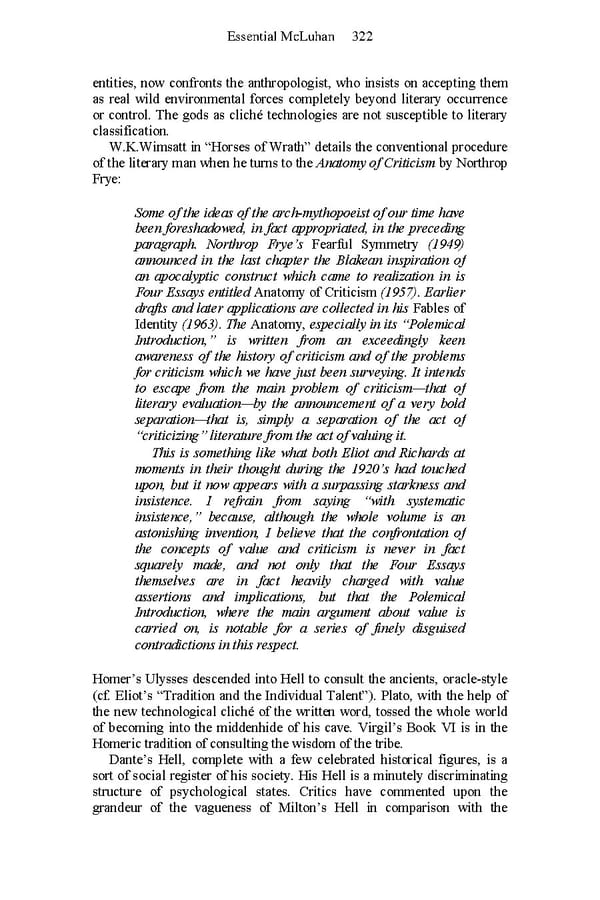Essential McLuhan 322 entities, now confronts the anthropologist, who insists on accepting them as real wild environmental forces completely beyond literary occurrence or control. The gods as cliché technologies are not susceptible to literary classification. W.K.Wimsatt in “Horses of Wrath” details the conventional procedure of the literary man when he turns to the Anatomy of Criticism by Northrop Frye: Some of the ideas of the arch-mythopoeist of our time have been foreshadowed, in fact appropriated, in the preceding paragraph. Northrop Frye’s Fearful Symmetry (1949) announced in the last chapter the Blakean inspiration of an apocalyptic construct which came to realization in is Four Essays entitled Anatomy of Criticism (1957). Earlier drafts and later applications are collected in his Fables of Identity (1963). The Anatomy, especially in its “Polemical Introduction,” is written from an exceedingly keen awareness of the history of criticism and of the problems for criticism which we have just been surveying. It intends to escape from the main problem of criticism—that of literary evaluation—by the announcement of a very bold separation—that is, simply a separation of the act of “criticizing” literature from the act of valuing it. This is something like what both Eliot and Richards at moments in their thought during the 1920’s had touched upon, but it now appears with a surpassing starkness and insistence. I refrain from saying “with systematic insistence,” because, although the whole volume is an astonishing invention, I believe that the confrontation of the concepts of value and criticism is never in fact squarely made, and not only that the Four Essays themselves are in fact heavily charged with value assertions and implications, but that the Polemical Introduction, where the main argument about value is carried on, is notable for a series of finely disguised contradictions in this respect. Homer’s Ulysses descended into Hell to consult the ancients, oracle-style (cf. Eliot’s “Tradition and the Individual Talent”). Plato, with the help of the new technological cliché of the written word, tossed the whole world of becoming into the middenhide of his cave. Virgil’s Book VI is in the Homeric tradition of consulting the wisdom of the tribe. Dante’s Hell, complete with a few celebrated historical figures, is a sort of social register of his society. His Hell is a minutely discriminating structure of psychological states. Critics have commented upon the grandeur of the vagueness of Milton’s Hell in comparison with the
 Essential McLuhan Page 328 Page 330
Essential McLuhan Page 328 Page 330